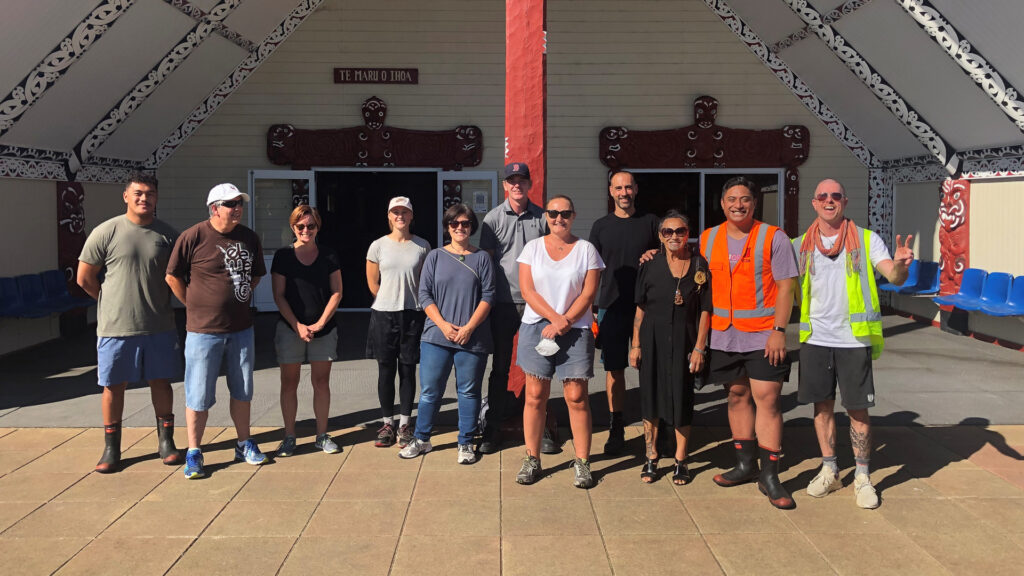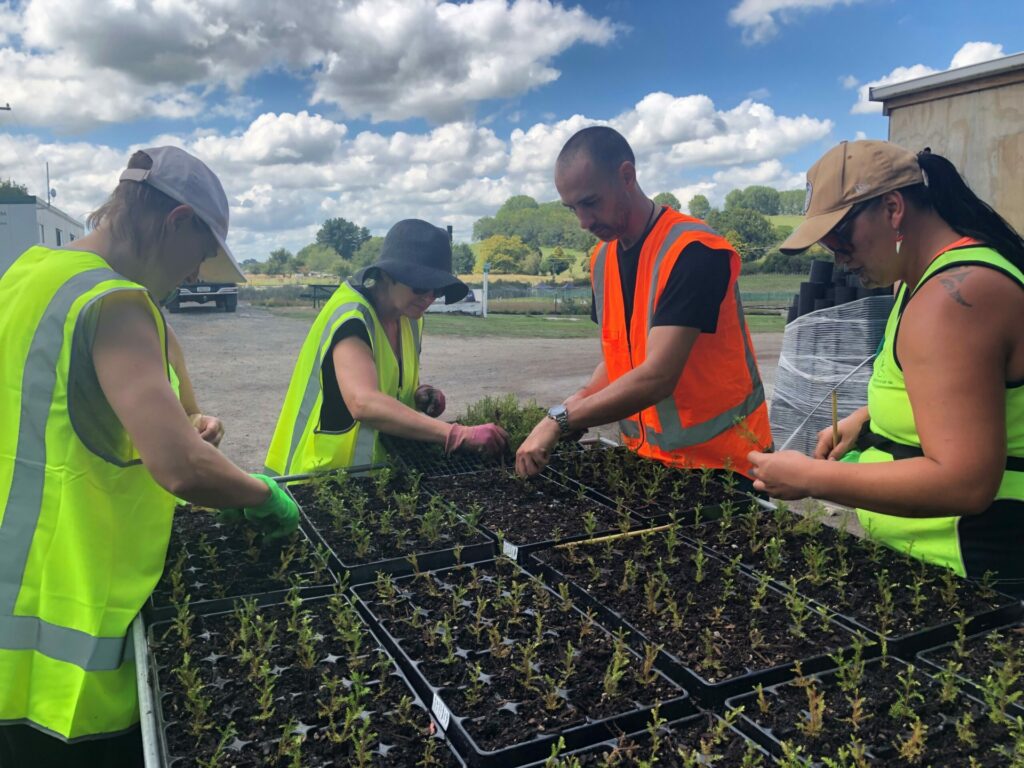A journey to better integrate te ao Māori in our built environment

Miko Brouwer (centre left) and colleagues from RDT Pacific with Pūniu River Care whānau at an Open Day at their Tokanui nursery.
The built environment is where people and place matter, and the smallest detail has the power to transform experience. RDT Pacific Associate Miko Brouwer is a passionate advocate for the inclusion of te ao Māori (Māori world view) and mātauranga Māori (Māori knowledge) in the Aotearoa built environment, and recognises there is not one way, but many to embed this.
“There is growing awareness that engagement with iwi is important, and people want to do the right thing, but it is also mandated in a lot of instances. It’s still new to many people and not everyone knows what it means or where to start,” says Miko who leads the RDT Pacific Kirikiriroa Hamilton team.
Following her participation in a te ao Māori programme at RDT Pacific in 2021, Miko was inspired to look beyond the projects she oversees and her individual impact and explore ways she could contribute to the company’s journey.
Back in Kirikiriroa, Miko started work on an iwi partnerships programme that became the catalyst for a pathway of growth and development. It is generating opportunities – from rangatāhi internships and reciprocal work for local iwi, to facilitation roles in iwi engagement and workstreams for RDT Pacific clients.
Miko who is of Japanese, Dutch descent, grew up in the heart of rural Waikato with the influence of her whāngai pāpā Māori (stepfather) and whānau. As a project manager and capital intelligence consultant, she says implementing cultural understanding into the built environment is “a passion point”.
“During the programme I attended, I listened to the questions and the discussion, and it highlighted the gaps and the need for better knowledge. I came away from that course with a confidence boost and felt inspired to use what I knew to help make change.
“We were encouraged to “walk the talk” but the challenge was, how do I apply that? And how do we respond to our obligations under Te Tiriti?
“I’m big on creating action once the strategic direction has been set. So, it got me thinking about what we can do here in the Waikato to demonstrate that we’re acting on equality, creating opportunities and filling those knowledge gaps.”
Aware that land settlements were in place and that RDT Pacific had the skillsets to support with asset management and development advice, the initial idea was to form reciprocal partnerships with local iwi. Reaching out to a Ngāti Maniapoto iwi advisor she worked with, resulted in an introduction to Māori-owned Pūniu River Care Inc. an established marae-based river care group, an incorporated society and a New Zealand registered charity.
The kaupapa (purpose) of Pūniu River Care is to enable the local community to be involved in the environmental restoration and enhancement of the Pūniu River catchment, while providing employment and work experience opportunities for rangitāhi and whānau.
Miko, and a group of RDT Pacific colleagues attended an open day organised by Pūniu River Care at their Tokanui nursery and was inspired by their kaupapa. A partnership with Pūniu River Care soon developed that has included an internship programme, sponsored Project Management training and volunteer days.
“Our first intern was introduced through Pūniu River Care a couple of years ago, he was an engineering student studying in Auckland and he did a summer placement with us. Now we are working on ways to take the internships programme to the next level by cycling interns through different disciplines like architecture, planning and engineering so they get a taster of what’s out there,” says Miko.
“We have also welcomed four members from Pūniu River Care and Ngāti Maniapoto to the RDT Project Management Study Group to upskill and gain qualifications in our Project Management qualification programme.”
Pūniu River Care Pou Tāhūhū – Chief Executive, Shannon Te Huia says the relationship with RDT Pacific has been a great journey.
“We are often constrained by our capacity and capability which limits our opportunities significantly. RDT have opened the door to increase our skills in project management by coordinating study sessions and helping us access resources.”
This reciprocal partnership continues to flourish for both sides. Recently, Pūniu River Care engaged RDT Pacific to help with their strategic planning with a view to demonstrating commercial viability.
“Would we have done this if they weren’t partnered with us? Possibly not,” says Miko.
“Although we regularly assist our clients with strategic planning relative to their capital assets and plans, this particular application is a bit outside our normal day’s work. But we want them to progress, to be able to attract investors and we can help them.
“So, the project is evolving, we’ve applied our research and co-design skills, and we’ve started by doing due diligence to tell them what the market is saying so they can take those next steps in a strategic direction.”
Shannon says this recent piece of work has seen RDT Pacific support their journey toward financial sustainability, involving wānanga with the Pūniu River Care senior leadership team.
“We enjoyed the energy, insights and professionalism of the RDT team and are very pleased with the outcome of the due diligence report.
“RDT have experience and skills but most of all, they show a huge amount of respect for te ao Māori.”
There is external commissioned work now too. Miko has been coordinating with local iwi groups to co-design the cultural narrative and its expression for the Waikato Regional Theatre, where RDT Pacific is Project Manager.
“Because of our iwi relationships, we have been asked to handle cultural engagement for the Waikato Regional Theatre Art Integration workshop. For this engagement, we are taking the discussion to each representative hapū group and holding wānanga at our local marae.”
Embedding co-design processes and relationships that celebrate te ao Māori in all spaces, is truly a work in progress. There is a real shortage of Māori working in the built environment advisory and planning space, but growing awareness and authentic partnerships are planting the seed.
“We are increasingly acting as a conduit and introduction between our commercial clients and hapū to encourage correct cultural protocol and tīkanga on projects.
“It’s a space I have naturally fallen into and there are so many very cool things happening right now.”

RDT Pacific and Pūniu River Care are working together to grow a strong partnership.







